From Elvis to Kanye: Here’s everything you need to know about band merch
-1.png)
What band tees have you got lurking in the back of your closet?
A symbol of rebellion, of teenage angst, of political change: there’s a lot more behind band merch than you may originally think.
And one thing’s for certain: band merch is only gaining in popularity.
From exclusivity to community, music industry merch has redefined and reinvented promotional merchandise for the better - and we love it!
Are you ready to learn from the best and make your promotional merchandise campaigns a sold-out performance?
For more epic festival merch inspiration, download your own exclusive Festivals & Events brochure now, or get in touch for your free consultation with one of our Merchandise Consultants.
The popularity growth of music merchandise
1970s & before
Before the 1970s, band merch and memorabilia didn’t have the same appeal as it does now. It wasn’t seen as “cool” to sell merchandise, with many acts missing out on what would later be seen as a very lucrative revenue stream. Even Elvis didn’t monetise his merch until later, even though he’d had a merch branch of his brand since the 1950s. The Beatles also failed to ride their fame further with merch when they began, with many fans relying on bootleggers and knock-offs at the beginning.
"In the ’70s, it was not cool selling merchandise, so we had to be careful. Groups would say, ‘OK, you can sell, but don’t embarrass us. Stand in a corner."
Dell Furano, Rock merch pioneer
Today
In major contrast, band merch has never been so popular!
Download Festival is the most popular for merchandise, with visitors spending an average of £56 million a year on merch.
But they’re not the only ones - Leeds Festival has seen an increase in merchandise searches of an astonishing 119%, and Reading Festival’s merch sales are up by 65%.
Travis Scott sold $1 million worth of merchandise when he performed in London’s O2 arena in August 2022.
And when Frank Ocean played Lovebox in 2017, his unique take on merch (getting fans to print their own T-shirts) was so popular it ran out of ink.
This is an insane contrast to how band merch started, so what happened? Why is band merch so popular now?
Read more: Gear up this festival season: don't forget these 12 merchandise favourites!-2.webp?width=400&height=211&name=ezgif.com-gif-maker%20(1)-2.webp)
Why is band merch so popular?
With consumers
1. It’s a symbol of rebellious nonconformity
What music you listen to defines who you are. For many, it determines how they portray themselves to their friends, family and strangers, as well as showing the world, “Hey, this is who I am!”
Band tees are especially popular for building this individuality. When we wear a band T-shirt, we become a part of the group.
But, this phenomenon didn’t start with band tees.
In the 1950s, ‘outsiders’ would differentiate themselves by what they wore - leather jackets and dapper bow ties - these became symbols of nonconformity. Then, in the 1960s, protest tees were everywhere thanks to anti-Cold War sentiment. This eventually gave way to the band-tee we all know and love today.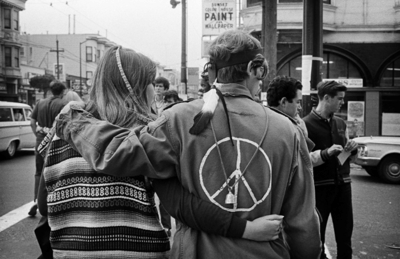
Band tees stand for anarchy and resistance, for individuality and allegiances. There’s an emotional connection between the wearer and the tee, unlike any other piece of clothing.
"In today’s streaming world, merchandise is still one of the best ways that fans can express their passions and personalities."
Max Lousada, CEO of Recorded Music, WMG.
2. It’s a limited edition status symbol
When it comes to consumers, the exclusivity and rarity that band merch is super addictive. These aren’t just everyday items you can pick up at your local Primark, they’re limited edition. They’re status symbols that can be traced back to a specific tour or time in history. For fans, this is a physical representation of the fact that they are SUCH big supporters of the band and that they are now part of an exclusive group - you just HAD to be there.
3. It’s a community
Overall though, band merch gives fans a chance to be part of a community. For example, the same way you’d count yourself a ‘swiftie’ if you liked Taylor Swift, merch tangibly does that.
“The Grateful Dead looked upon selling shirts as a 'community thing' and were pleased to have their fans wearing Dead shirts."
Dell Furano, Rock merch pioneer
With performers
1. It’s guaranteed revenue
Because band merch is so popular, performers know it’s a safe investment with a guaranteed revenue stream.
This was especially true during the pandemic when live performances were banned.
And now, thanks to the cost-of-living crisis, the revenue from ticket sales isn’t as secure as it might once have been, leading to more reliance on merch to pay the band’s bills.
Jordan Gaster, head of A&R at Sandbag, notes that, “Unless you’re a mainstream pop artist, [artists are] making more money on their merchandise than they are from a record.” It’s a safe and stable way to make money, whatever size you are.
“I’m pretty sure the only reason we don’t lose [money] is merch.”
Singer-songwriter Liz Lawrence
Why is band merch so popular?
The 1940s to 1960s: the birth of Rock merch
The 1940s to 1960s sees the first use of band merch, plus its shaky beginnings. Strange to think now, but branded band products weren’t always as popular as they are now. It wasn’t until the 1970s that music merchandise took off.
The first examples of band merch
It’s thought teenagers created the very first example of band merch! Called ‘bobbysoxers’, the teenagers grabbed pens and wrote the names of their favourite bands across their clothing to wear with pride.
The first-ever official band tee was reportedly made by an Elvis fan club in the 1950s.
In the 1960s, with the invention of the first rotatable multicolour garment screen printing machine, band merch could now be produced in mass, and official merch was born.
Elvis Presley: The King of Rock
Elvis isn't just a big name in music, he’s a big name in the history of merchandise, too.
In 1956, Special Products Inc. were permitted to promote the image of Elvis. A company well-known for handling merchandising opportunities for TV shows like The Lone Ranger and Disney characters including Mickey Mouse and Peter Pan, they were soon producing 30 different branded products for Elvis - including what would become the first printed tee to promote an artist on the music scene. 
And they didn’t just target Elvis lovers with their merch. You’ve probably seen the famous ‘I Hate Elvis’ badges. Produced by his manager Colonel Parker in the mid-50s, they capitalised on people who didn’t even like Elvis!
Now, that’s some clever merch.
The Grateful Dead
After Elvis broke into the music merch scene in the 1950s, The Grateful Dead claimed their spot in merch history in the 1960s.
In 1966, their infamous Grateful Dead skeleton and roses motif was created by Stanley Mouse as a nod towards anti-war protests in San Francisco in the ‘60s. This helped them to grow a following amongst San Francisco's rebellious community, cementing them as rock legends.
The Beatles
In the 1950s, due to having an inexperienced manager, The Beatles weren’t able to capitalise on their quick ascent to fame right from the beginning with merch.
They didn’t sign any merchandise contracts at the beginning, and so only received 10% of any merchandise profits.
However, due to the rise in popularity of band merch, in 1964, The Beatles fought their previous agreement and settled with a much healthier 46% stake in their merch - worth millions. 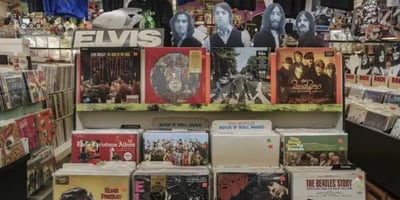
The 1970s band merch explosion
This is when merchandise started to kick off in the music industry.
According to historian Glenn A Baker, AC’DC were the first EVER band to make more money from merch sales than tour tickets. They led the way for others like KISS with their bobbleheads and The Rolling Stones with their insanely popular T-shirts.
It was also during this time that bands started to be inventive when it came to their merch.
From homemade zines to badges and buttons, whatever was affordable and popular with their audiences, bands branded. T-shirts that were exclusive to event locations became highly sought after, with machines originally made for printing bowling garments repurposed to meet demands.
The 1970s was when band merch truly exploded in popularity, leading the way for the band merchandise we see today.
Bill Graham
The pioneer of modern band merch, German-born Bill Graham started as a concert promoter, managing acts like the Grateful Dead, Big Brother and the Holding Company.
Through his political endeavours and anti-Vietnam War protest clothing, Bill led the way for clothing to be more than just something we wore: to be a part of our identity.
Without Bill Graham and his Winterland Productions merchandising company (the first concert T-shirt merchandising company), band merch might not have reached the lofty heights it has today.
KISS: rock and roll all night
Helping merchandise gain notoriety during the ‘70s was KISS.
We’ve probably all worn their logo at one point or another. Designed in the early 1970s by Ace Frehley, their logo became synonymous with KISS merch, with people wanting to grab their very own T-shirts before they all sold out. 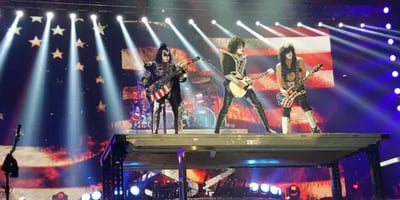
What’s pivotal here is that they developed a way to connect with their audiences on a physical level through their merch.
"Bill Aucoin always saw the bigger picture, he could tell that we connected with our fans in a way that far exceeded the norm. He grasped the extent to which people would respond to us beyond the music: he understood the potential of merchandising."
Paul Stanley talking about Bill Aucoin, KISS’ manager
The Rolling Stones
Created by John Pasche and inspired by Mick Jagger, the brand’s legendary tongue has been plastered all over merchandise going on for over 50 years now, proving the longevity of good band merch. At the time, Pasche only received £50 for his work.
Vivienne Westwood
Outlandish, brave and rebellious: Vivienne Westwood was a trailblazer when it came to merging fashion with subcultures. She revolutionised the whole concept of the band tee with her anarchic slogans, helping them to become part of the mainstream fashion industry. 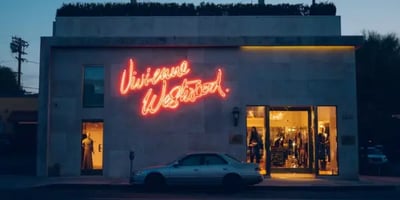
And at the end of the 1970s, Vivienne Westwood and Malcolm McLaren put their creative heads together and created the mindblowing “God Save The Queen” T-shirt for The Sex Pistols.
The 1980s: The Licensing Industry Merchandisers' Association
After the soaring popularity of band merchandise in the 1970s, the ‘80s saw it become more streamlined. In 1985, The Licensing Industry Merchandisers’ Association was formed to represent the interests of trade groups in the band merch music industry. This was the official start of band merchandising like we see today.
The 1990s and beyond: merch ain’t dead
Although band merch has never lost its popularity, from the 1990s onwards, ‘festival fashion’ defined music industry merch. Thanks to model Kate Moss at Glastonbury Festival, band merch and festival attire have become more mainstream than ever before.
Read more: 14 must-have festival camping essential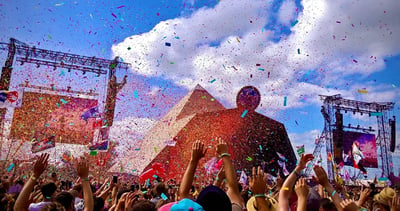
Iconic music merch you need to know about
1. Madonna’s rubber bracelets
A throwback to the 80s, but Madonna’s iconic rubber bracelets have gone down in festival merch history. They became a fashion staple, even up until the early 2000s. Worn in performances, the bracelets ended up in stores worldwide - a primary example of merch transcending arenas.
2. The Rolling Stones’ tongue T-shirt
As previously mentioned, The Rolling Stones’ tongue logo has only become more popular with age. Originally used for the first time on the release of their Sticky Fingers album in 1971, a T-shirt from that particular tour is on sale for £685 on eBay! 
3. A rare Led Zeppelin T-shirt
Back in 2011, a rare Led Zeppelin tee from their 1979 performance at Knebworth sold for a whopping $10,000! Originally printed as a fun alternative to a backstage pass, few were produced, leading to this one’s particular high resale value.
4. The Ramones T-shirt
Probably one of the most recognisable band tees around, the Ramones T-shirt with Arturo Vega’s ‘Presidential Seal’ design was created to market the Ramones as the quintessential American rock band. And it worked. 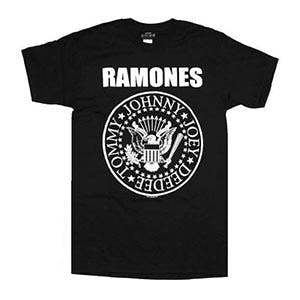
5. Pink Floyd’s ‘Dark Side of the Moon’ logo
Worn by fans and newbies alike, Pink Floyd’s ‘Dark Side of the Moon’ T-shirt just sums up what band merch truly means. The design represents them, their music, their performances, and their fans. The record itself is seen as one of the most influential albums of all time, and it just goes to show that merch can have a massive longevity impact, too.
6. The Red Hot Chili Peppers’ ‘Star of Affinity’ logo
Known the world over, The Red Hot Chili Peppers’ ‘Star of Affinity’ is one of the most iconic band logos. The story behind the logo is even more fascinating. The band were asked last-minute to design a logo for promotional purposes, so Anthony Kiedis sat down and drew the first thing that came to mind. And, as they say, the rest is history.
7. Metallica & Stranger Things
Collabs are awesome for everyone involved, especially fans. When Metallica collaborated with Netflix on a T-shirt combining their logo with that of the Hellfire Club from Stranger Things, it blew up!
8. ‘Ye’ merch
In promoting his ye album, Kayne West launched his own online merch collection. The collection was designed by the Yeezy creative team and ranged in price from $65 -$145. This is a primary example of how merch has now moved into the mainstream retail markets.
The future of music merch
As with everything, the future of band merch is most likely digital.
For Travis Scott’s virtual concert in Fortnite, you could buy merch for your avatar, and he ended up earning approximately $20m for this event.
Whether digital merch will become as popular as physical merchandise will depend on the progression and popularity of technology with such things as the Metaverse and beyond.
Whether digital merch would have the same effect as physical though, of defining subcultures and portraying your personality, is yet to be seen.
From political statements to cheap mainstream knock-offs, it’ll be a shame for them to lose their original feisty attitude.
“I think the reason merch is so interesting is that it’s tangible and people can interact with it – communities are formed.”
Daniel-Yaw Miller, an editorial associate at The Business of Fashion
What your brand can learn from band merch
1. Exclusivity
Making your merch exclusive or limited-run means that the demand for it will prove more popular. It’ll have that luxury feel to it, with those lucky enough to get their hands on it feeling more emotionally connected to the merch. Exclusivity is your friend!
2. Being a part of a community
Brands aren’t just a name on a label now, they’re a whole community of like-minded individuals. With 68% of Gen Z basing their shopping preferences on what a brand’s real-world impact is, it’s all about being a part of that positive brand community. Choosing your merch carefully and ensuring it makes sense to your brand’s story will help to build and expand your brand’s community.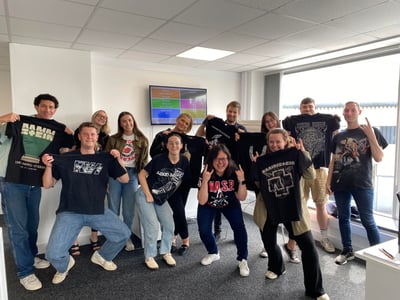
3. FOMO
One of the most influential reasons band merch is so popular is that feeling of FOMO you have when you’re missing out. Similar to exclusivity and being part of a community, FOMO is especially effective when merch is linked to a specific event. For example, if your brand only did certain sought-after merch at specific conferences, this would cause FOMO with those who didn’t attend.
4. Physically represent brand values
Your merch choices are a reflection of your brand values. Bands have succeeded with this through crazy artwork and logos, bobbleheads and keychains or through political statements. Whatever your brand values, we can help you find the best merch.
Read more: Breaking news: festivals go plastic-free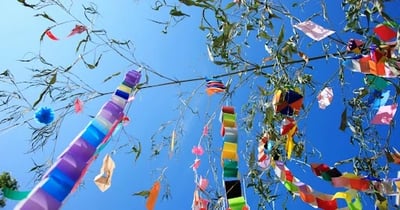
Rock out with merch this festival season
Whether you're an Elvis fan or would rather be in a heavy metal mosh pit, we’ve got all the merch your brand could need for your summer festival campaigns.
Download your exclusive Festivals & Events brochure now, or get in touch for your free consultation with one of our Merchandise Consultants.

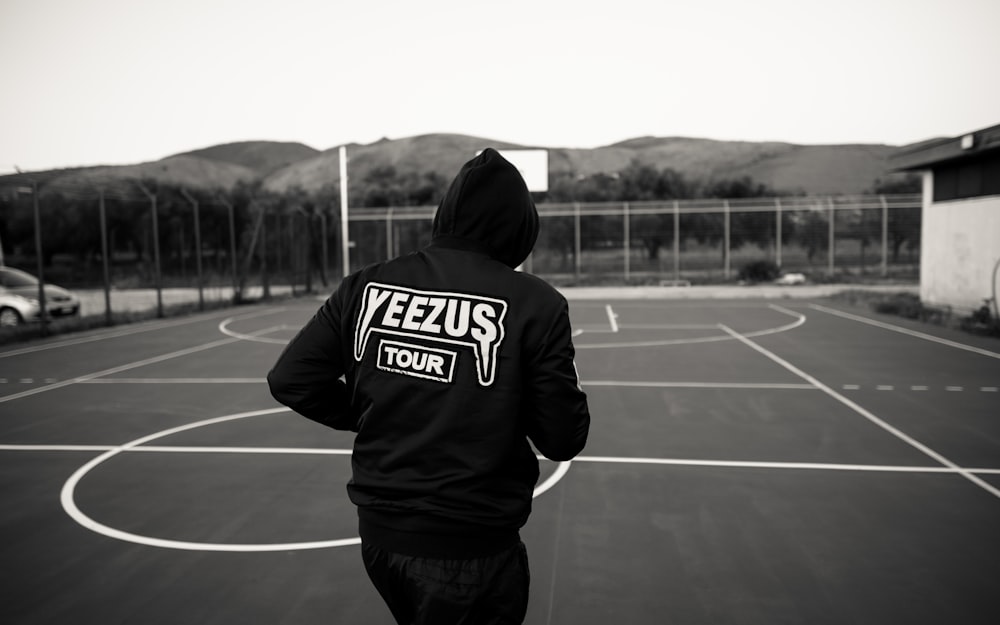

.webp)